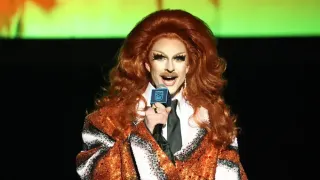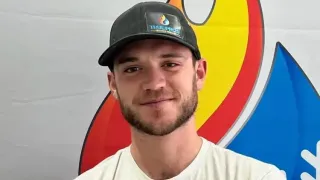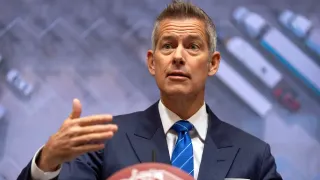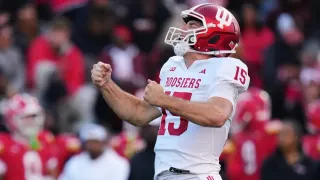June 30, 2016
The Trans Theater Festival
Terence Diamond READ TIME: 6 MIN.
Concluding last weekend, the Trans Theatre Festival at the Brick Theater in Williamsburg is the first such festival since 2003's "Stages" produced by dramatists Riley McCloud and Tom Leger. This year's festival offered theater, dance, film, web series, visual art, educational programming, and a panel discussion on trans issues in the Indie theater scene. M.J. Kaufmann and Maybe Burke curated.
"The Astonishing Adventures of All American Girl & The Scarlet Skunk," written & directed by Charles Battersby presented a comic strip style spoof of postwar '40s superheroes.
"Singin' and Talkin' with Christopher Walken" proffered a late night sketch series about the everyday trans masculine experience (riffs on the popular FTM name, Aiden) with the insouciance of a senior thesis. Emma Miller and Rhys Roffey created and starred with an additional work by Jay Zahn.
"Radclyffe: The Completely Honest and Mostly True Story of Victorian England's Second Most Notorious Invert" was written and performed by Kestryl Cael Lowrey. Described as a "pseudo-history," it is a casual riff on the author of the classic lesbian novel, "The Well of Loneliness," by Radclyffe Hall.
Trans-identified people of color offered dramatic work of honesty and vulnerability. Some stood out for originality and poetical language.
In "British Honduras Fantasy," time and place is malleable when Frida, a young trans girl, moves from Florida to Chicago in search of herself. Her transition and physical displacement parallels that of her mother's immigration to America. An Alligator who wants to leave the swamp and become a star in the city adds a touch of magical realism to a charming effect. Written by Ariel Zetina, Directed by Tristan Powell.
Storm Thomas' "Notes on the Past" offers interlaced stories to show non-conforming bodies engaged with grief and loss. With seemingly random digressions of gender theory discourse, lessons on ally-ship, incessant journal readings, and a trip to Burning Man, the point is largely (and intentionally) obscure. Abstraction for its own sake doesn't equal good theatre. The style is self-conscious and self-referential as well as self-deprecating. Part 2 is announced as taking "place in my brother's coffin" and the play promptly ends. One suspects the writer buried the lede. More about the loss of a brother and how it affects a gender nonconforming body would have been welcomed.
Written by Storm Thomas, and directed by Marisa Clementi.
Kit Yan is a transgender, queer, Asian-American from Hawaii and an award-winning slam poet and performer. His "Queer Heartache" is a one-person slam poetry play that discovers his trans identity through diaspora and a multi-lingual upbringing. The play is divided into "Poems" and "Acts." His use of vernacular to describe his Hawaiian childhood, Poem # 2 Plastic, is reminiscent of poet Ryka Aoki's fiction especially, "He Mele A Hilo: A Hilo Song." This comprises one scene where he riffs about his family's scrupulous recycling of all things plastic.
In Poem #4, Hello My Gender Is... he schools the audience on gender identification. One pithy verse could be printed on a business card and kept in your wallet to read to any cishet folk who dares to ask.
"Because sometimes my gender is,
Boy who looks like a girl, who like boys.
And sometimes my gender is,
Trans,
And sometimes my gender is,
Chillin' out in between,
But most of the time my gender is fuck you mind your own business!"
The second act contains a sensual poem of a sexual encounter with a dude, a tender portrayal of a younger brother, Edwin and a discovery of queer solidarity with amorous tortoises, Josh and Drake. Finally in heartbreaking account of his father's death at the hands of neglectful hospital authorities, Yan gets to the play's theme of heartache. He cautions that he and other queer people of color would be left to die in the street if they forget "the strength in our own tongues, the resilience, the resistance, in our own language." He offers a final observation:
"Something's broken,
The systems failed me, and
Here I am desperately trying to break free,
Tell myself that heartache is queer and healing can be too."
Written & Performed by Kit Yan
Directed by Jessi D. Hill
The festival offered two solo shows with characters aspiring to surprisingly similar romantic and hetero-normative ideals of relationships.
"Chasing Blue"
At the top of the play, a young woman (Bea) sits center stage in a bubble bath indulging in a moment of self-care while romantic music plays. When the music stops she looks around, startled. She addresses the audience and welcomes them into her mind, "You're in a trans lady's bathroom." She tells us she is waiting for the boy she just met to arrive for their first date. Bea possesses the blonde perfection of a young Grace Kelly as she exits the bath, dons a grey sheath dress and a string of pearls while securing her hair in an up-do and applying tasteful makeup. Over the course of 70 minutes, her past as a young trans girl unfolds through poetry, stories, and music. We soon learn that if Bea wants anything out of life, she wants her suitors to "see" her.
Bea Cordelia is adept at communicating the pain of abandonment by trans phobic lovers and the spiritual degradation caused by sex with strangers, One winces at her unapologetic romantic vision of love:
"I miss believing that sex was only ever reserved for love, for marriage even.
I miss knowing that one day I would get married.
I miss only ever reserving sex for love."
Over the play's duration, Bea slowly unravels. Waiting for that first date, she believes it will solve all her problems.
"No more strangers, no more cruising, no more Craigslist, no more finally getting fucked at four thirty in the morning before crying in the shower and going to bed and meeting a professor just five hours later.
I'm ready to settle down.
I'm ready. I am ready."
Witnessing the psychic self-harm caused by unattainable romantic expectations is both disturbing and moving. Over time, with maturity, one trusts Bea will find a middle ground for her romantic visions. By the end of the play she does survive to live another day. In real life, young trans women like Bea don't always see the night through.
Ms. Cordelia as Bea is gifted writer/performer. Direction by Andrew Hitzman achieves a completely realized world on the postage stamp size stage.
In "Love Letters to Nobody, or Insignificant Others," Maybe Burke plays a young non-binary trans person named Maybe who harbors a similarly hopeless romantic ideal as expressed in "Chasing Blue."
"I just want to get married!" Maybe shouts at one point, frustrated with serial romantic failures. At its core "Love Letters" concerns the unhappy truth that one's identity, sexuality, and ability to love cannot escape unscathed the ravages of trauma.
On a set with dangling bits of twine attached to pieces of handwritten notes, a story unfolds elliptically in bursts of conversation interrupted by gyrating dance moves. The director delegated discrete sections of the stage for dialogue with individuals from Maybe's past -- ex-lovers, family, an unsafe memory zone -- and for the present self.
The stage becomes a confessional as the character confronts the pedophile abuser of their teen years. After a number of conversations with fickle lovers, Maybe appears finally to work out the obvious connection between dysfunctional adult relationships and past sexual trauma. A common experience among transgender children, this victimization is an unfortunate effect of parental rejection and institutional transphobia. We need more theatre artists like Maybe Burke that honestly add complexity to the narrative of growing up trans and do so with style and heart. Written and performed by Maybe Burke. Directed by Ariel Mahler.
"Pass/Fail" is a short, comic monologue about failure. It begins with performer Ashley Lauren Rogers' recall of her jovial school valedictory to her high school classmates, "I hope you all fail!" and ends with the same wishes to the audience. Rogers explains her rationale in the 50 minutes of wry observations about life as a trans woman who cannot possibly pass at 6 foot 4 inches.
Roger ranges on a variety of subjects, how to be yourself in preschool, how to be friends on Facebook with other trans people, how to fail at beauty school and at acting. She turns didactic at times, offering definitions of commonly used terms in trans communication like the term "passing." Rogers is an adept comic. Let's hope we see more of her in New York. Written and performed by Ashley Lauren Rogers, directed by Samantha Elizabeth Turlington.






